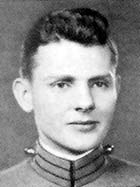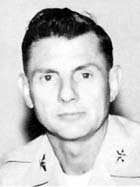Courtesy of his classmates, United States Military Academy:
Donald Eugene Wilbourn
No. 13215 • 10 October 1918 – 13 April 1996
Died in El Paso, Texas, aged 77 years
Interment: Arlington National Cemetery, Arlington, Virginia

Donald Eugene Wilbourn was born in Kennett, Missouri, but he spent most of his childhood in El Paso, Texas. He was valedictorian at El Paso’s Austin High School’s Class of 1936 and attended the Texas College of Mines for two years while recuperating from spinal meningitis (a disease his doctor had told him would make walking difficult and most likely keep him from attending West Point). The next year, however, he had recovered and was able to accept his appointment to USMA.
Cadet life agreed with Don. Roommate John Johnson recalls:
“Not only did Don do well on the initial plebe physical tests but he also beat the rest of us in the half-mile run. Don was always so pleasant and easygoing that few of us as plebes realized that this was a man who would be a cadet captain and ultimately would command our company!”
Don was chosen to be a company commander during “Beast Barracks” in the summer of 1942 and commanded Company D-1 as a First Classman. Upon graduation, he married his college sweetheart, Jane Louise Wilson, also of El Paso.
The newly commissioned Lieutenant Wilbourn served as an Artillery forward observer and liaison officer for Company A, 359th Infantry as part of the 915th FA Battalion supporting the 90th Infantry Division in the European Theater during WWII. He participated in the Normandy Invasion, going ashore at Utah Beach. He received the Purple Heart for wounds at the Battle for Beau Coudray and was awarded the Silver Star for his part in the VIII Corps attack south of Seves Island. The 359th met heavy enemy resistance but Lieutenant Wilbourn directed the artillery fire that enabled the 359th to overtake the enemy rear guard south of Perriers. This resulted in the ultimate capture and occupation of St. Sauveur de Lendelin.
He received another Silver Star for action near the town of L’Arche (east of Vaiges) that enabled T.F. Weaver to continue advancing to Le Mans and onward to what would become the Mayenne River Crossing. A/359th held, lost, then ultimately regained the town of Le Bourg as a vastly superior force from the SS Panzer Division, Das Reich, desperately tried to open an escape route. Lieutenant Wilbourn and his forward observer team were able to stop successive German counterattacks by directing critical Artillery fire from a position in the attic of a house within the enemy-occupied town. This culminated in the decisive Battle of the Falaise Gap resulting in the capture of more than 13,000 German soldiers. There, Lieutenant Wilbourn and two soldiers were able to bluff about 100 demoralized Germany troops into surrendering. He received the Bronze Star with V for accomplishing that.
Later, the 90th Division crossed the Moselle River where classmate Johnny Mitchell was, and he reports:
“My troop was part of a reconnaissance squadron in an armored division. We were to break out of the newly established bridgehead by the 909th Division on the other side of the Moselle River and help capture the French fortress city of Metz. We crossed the river, pausing briefly in what appeared to have once been a quaint village. The damage and the carnage caused by the fight for the bridgehead was horrendous! I asked a weary, muddy soldier if there were any officers nearby. He said, ‘Over there, inside the building.’
Inside that building, by then little more than a pile of rubble, was Don Wilbourn using a voice radio and looking ‘spoony’ enough to lead troops in a parade! Don was cordial and completely relaxed. He gave me a big ‘bear hug’ along with the information I sought, and said, ‘Now that you tankers are finallly here maybe I can take a little break. I would like to read some of this paperback novel that my Louise sent. It arrived about a week ago, but we’ve been kind of busy.’”
Ater the war, Louise and Don’s infant daughter, Martha Jane, whom he had never seen, joined him in Germany, where he served as a staff officer during the Occupation. A second daughter, Janice Louise, was born while Don was an instructor at Fort Sill. A son, Donald Edward, was born after Don and Louise had returned to Germany. Donald served first as a Personnel Officer with Seventh Army in Stuttgart and then a Commander of the 107th FA Battalion in Ulm. In 1955, he attended CGSC and then spent a year as an Artillery Advisor with MAAG, Viet Nam.
Following a tour as a staff officer in the Office of the Deputy Chief of Staff for Personnel in the Pentagon, Don was honored to be selected for duty as a military history professor at USMA. It was during this tour that both of his daughers met their husbands and his son decided to become an Army officer like his father. In his final year at USMA, Don served as a special assistant to the Superintendent — as the Academy’s first Gifts and Memorials Officer.
In the summer of 1965, Donald, Louise, and son Don began a three-year tour in Okinawa, where Donald served as the G-1 HQ, USARYIS and Executive Officer of Ft. Buckner and later as Acting Commander of Fort Buckner. During the Viet Nam War, Don served as a Personnel Officer and, later, as the Inspector General at Headquarters, U.S. Army, Viet Nam.
In 1973, after thirty years of dedicated service to his country, Colonel Don Wilbourn retired. His last assignment was as Director of Personnel and Community Affairs, U.S. Army Garrison, Fort Bliss, Texas. In retirement, Don took a few history courses at the University of Texas, El Paso, played tennis as often as he could, and made frequent marathon trips with Louise to visit their children and grandchildren. Classmate Al Hughes remembers his 50-year friendship with Don and Louise with
great fondness:
“We always considered them to be our best friends. Our families grew up together as our service assignments overlapped. We both retired in El Paso and enjoyed our wonderful camaraderie for many more years.”
Colonel Wilbourn died after a long and valiant struggle with cancer; he was 77 years old.
Don Wilbourn was the consummate husband, father, grandfather, and Army officer. The three most important things in his life were his family, the Army, and West Point. He was proud of them all and served them all with the same selfless dedication and boundless energy. His example lives on in his son, his sons-in-law, and a grandson, each of whom has proudly served our nation as an Army officer. His grandson, Class of ’88, is currently a USMA faculty member just like his grandfather.
Colonel Wilbourn is survived by his daughters Martha Jane and Janice; his son Don, a retired Army officer; his brother Robert; six grandchildren; and two great-grandchildren.
Don Wilbourn’s ashes were interred with full military honors at Arlington National Cemetery with his classmates serving as honorary pallbearers. On 15 November 1996, in El Paso, Don’s beloved wife Louise followed him in death, a victim of ALS (Lou Gehrig’s Disease). Their ashes are interred together at Arlington.
Michael Robert Patterson was born in Arlington and is the son of a former officer of the US Army. So it was no wonder that sooner or later his interests drew him to American history and especially to American military history. Many of his articles can be found on renowned portals like the New York Times, Washingtonpost or Wikipedia.
Reviewed by: Michael Howard

